Was going over some old minue lessons today and found this interesting quote.
"When I was a kyu, I studied this basic joseki variations over and over again (maybe 10~15 times). Other joseki? I just ignored. This applies to other Go study topic. Talking about L&D, it's good to solve new problems. Much better than doing nothing. But, it's even better to solve again several times which we solved in past. So, in summary, for efficiency of Go study, we have to simplfy our study span, and focus on them. I dont mean, u should stop reviews with ur Go friends and many other enjoyable Go studies. What i mean is.. we have to give a priority to some specifid Go study plan, and focus on them. About all other Go study, we just regard as "fun"
So, when we can finish some specific topic? --> when we can find Correct responses on all expected opp's moves without any difficulty, but instantly. All these variations.. So, quantity is not so important. Quality (or intensity) matters more. For example, to study about this just one basic hoshi joseki is much better than to study 100 basic hoshi josekis superficially (for improving)"
I have been doing that over the last few months, and I think it is helping. It took me a while to figure out which study plan works for me, and to get rid of the nasty blitz habit (which was taking away from study time). I used to think that I had to know 'all those joseki' and was feeling kind of overwhelmed. Now I just choose one basic joseki / variation which I study more deeply for a while, and don't worry about the other 29,999 I am not studying right then.
The interesting thing is that the shapes I am studying, suddenly start coming up in other situations too, and my study proves to be useful outside this one joseki variation.
A friend just studied l-groups very deeply and it has definitely helped his game too. They are on my long list of 'subjects to study soon'.
Just finished the first semeai book of the Korean Problem Academy books. All pretty easy, but good reading practice. Today, I'll start on the second one. That is, after I finish my joseki study ^^.
Tuesday, December 26, 2006
Wednesday, December 20, 2006
Studying
Vincent asked to share more about my studying, so here goes.
I would like to say that I am a very organized person, and have a wonderful study plan, but I have to admit I am not. Just like in playing, focus and discipline are the main issues in my studying. I will study for a bit, check some email, study a few minutes, surf some links, study a bit, make some tea, remember that I was studying, and so on. I often end up not studying as much as I wanted.
As a very concrete example, just played through some recently studied pro games and now am writing this blog entry. Could have played through more games instead. It is something I'll need to work on, have to find what works for me.
But even with all the distractions (including the seven handicap stones I have running around ^^), I still get quite a lot of studying in most days. I always start with replaying some pro games, usually a few recently memorized ones, and I will take one older one and look at it again. Yesterday, I looked at the Yuzo - Shusaku game. I often see new things in old games when I look at them again a few weeks / months after studying.
I do go problems every day, a lot of easier ones, and usually some harder ones (but don't always get to the harder ones). My goal used to be 50 a day, but I don't really keep track anymore. I think I do at least 20 on a typical day, and often still reach 50 or more. It depends on how much car I spend in the car, waiting for my kids. Those problems are easy ones though, working through volume 1 of the semeai book of the Korean Problem Academy now, and whatever else I have laying around.
I have wondered whether it would be better to do a lot of easy problems, or a few harder problems when studying. I have read conflicting opinions on this. Last week, I asked sendol about this, and he said both are good.
I go through game reviews and recent lessons, to see again where I went wrong and where I consistently missed a big move. (still ^^) I also am slowly working my way through the lectures on the audiogolessons web site, it's a wonderful resource.
I have no idea how much time I would spend on an average day, since my study time is interrupted often by real life. But I hope this gives some idea of the things I study. I enjoy all of those, replaying pro games has a meditative aspect to it. And there is a thrill when I finally find the correct answer to a more difficult problem.
I would like to say that I am a very organized person, and have a wonderful study plan, but I have to admit I am not. Just like in playing, focus and discipline are the main issues in my studying. I will study for a bit, check some email, study a few minutes, surf some links, study a bit, make some tea, remember that I was studying, and so on. I often end up not studying as much as I wanted.
As a very concrete example, just played through some recently studied pro games and now am writing this blog entry. Could have played through more games instead. It is something I'll need to work on, have to find what works for me.
But even with all the distractions (including the seven handicap stones I have running around ^^), I still get quite a lot of studying in most days. I always start with replaying some pro games, usually a few recently memorized ones, and I will take one older one and look at it again. Yesterday, I looked at the Yuzo - Shusaku game. I often see new things in old games when I look at them again a few weeks / months after studying.
I do go problems every day, a lot of easier ones, and usually some harder ones (but don't always get to the harder ones). My goal used to be 50 a day, but I don't really keep track anymore. I think I do at least 20 on a typical day, and often still reach 50 or more. It depends on how much car I spend in the car, waiting for my kids. Those problems are easy ones though, working through volume 1 of the semeai book of the Korean Problem Academy now, and whatever else I have laying around.
I have wondered whether it would be better to do a lot of easy problems, or a few harder problems when studying. I have read conflicting opinions on this. Last week, I asked sendol about this, and he said both are good.
I go through game reviews and recent lessons, to see again where I went wrong and where I consistently missed a big move. (still ^^) I also am slowly working my way through the lectures on the audiogolessons web site, it's a wonderful resource.
I have no idea how much time I would spend on an average day, since my study time is interrupted often by real life. But I hope this gives some idea of the things I study. I enjoy all of those, replaying pro games has a meditative aspect to it. And there is a thrill when I finally find the correct answer to a more difficult problem.
Tuesday, December 19, 2006
Yuzo - Shusaku
Today, I spent some time studying game eight from the Yuzo - Shusaku sanjubango, played on March 7th, 1853. I finally got the book Invincible, and realized this game must be in it. I have studied it before, and it was interesting to get new insights from reading the commentary in Invincible. It also gave me some more historical background on this sanbujango (30 games match)
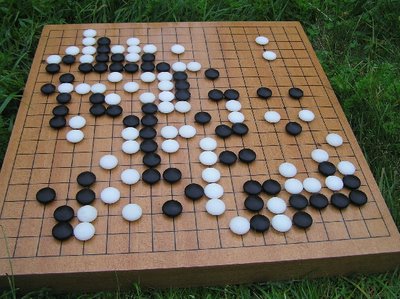
From Invincible "Shusaku's greatest achievement was his flawless record in the castle games, but the real climax of his career was the sanjubango with Ota Yuzo in 1853. Aged 23, Shusaku was approaching his peak; he had already scored eight of those wins in the castle games and had also bested all the top players of the day in individual encounters. The only player to hold his own against Shusaku was Ota Yuzo, 22 years his senior."
"The sanjubango between Yuzo and Shusaku is the most famous bango of the classical period and it represents a fitting climax to Edo period go."
Game eight of this series always has been one of my favorite games, it is fascinating to see how Black relentlessly attacks White. This three-way splitting attack is bloody awesome:
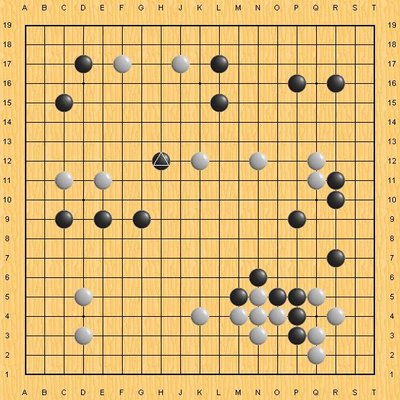
This is a great game to study and enjoy. It is the shortest of the series, but one of the most spectacular ones.

From Invincible "Shusaku's greatest achievement was his flawless record in the castle games, but the real climax of his career was the sanjubango with Ota Yuzo in 1853. Aged 23, Shusaku was approaching his peak; he had already scored eight of those wins in the castle games and had also bested all the top players of the day in individual encounters. The only player to hold his own against Shusaku was Ota Yuzo, 22 years his senior."
"The sanjubango between Yuzo and Shusaku is the most famous bango of the classical period and it represents a fitting climax to Edo period go."
Game eight of this series always has been one of my favorite games, it is fascinating to see how Black relentlessly attacks White. This three-way splitting attack is bloody awesome:

This is a great game to study and enjoy. It is the shortest of the series, but one of the most spectacular ones.
Sunday, December 17, 2006
Playing Less
And studying more. I have been annoyed by my lack of reading ability, so dived into volume one of the Korean Problem Academy semeai book. Easy problems, but I hope doing lots of them will help me increase my reading power.
Also been doing more basic reading problems and l/d problems, and focusing more on pro games. I haven't played blitz in ages, which frees up time for other things. I have been playing less, but the games I played were more serious. Which can only be a good thing, right?
Also been doing more basic reading problems and l/d problems, and focusing more on pro games. I haven't played blitz in ages, which frees up time for other things. I have been playing less, but the games I played were more serious. Which can only be a good thing, right?
Sunday, December 10, 2006
Tournament Tales III: The Games
My first game was againt a 1k. We both made mistakes, but I was leading till late yose when I missed some aji and lost too many points. End result 'W + 1.5' (This was a no komi game). I blame the stupid talking clocks, I have a hard time focusing once they start yelling at me. But it was a good game to study, so I didn't care.
The second game was against a shodan. I got 2H and did ok, he ended up resigning.
Last game was against a 2d. This was a 3H game. My opening was ok, but I totally screwed up the middle game fighting. Very very badly. I resigned.
I feel I played three good games, with mistakes, but also with some good moves. My time management is getting better, but the byo yomi still gets to me. I have considered playing faster, but I realized it was more important to fix my go first, and work on time management later. Time issues seem easier to fix. Tournament experience will help with it.
I enjoyed all the games and actually felt very calm while playing, so I guess some of my preparation did pay off. I also felt that watching the 'Winning a Won Game' lecture was very helpful, even if I ended up losing my won game :) I played reasonable games, with lots of study material in them. What really helped me mentally, was playing through pro games just before the tourney. It was very calming.
I kept my focus well during the games, so that was good. I now realize that my mental preparation was way more important than my go preparation. I wasn't going to increase much of my go skills in just a few days, but finding calmness and focus was a big help for accessing my existing go skills.
After the game, four of us went out for a nice dinner to rehash the day's games and happenings. Great day, filled with go and fun. Long drive back home, but it was worth it. I left the house at 7am , and came back after 11pm. Would do it again in a heartbeat. Just wish we had more tournaments in New England.
The second game was against a shodan. I got 2H and did ok, he ended up resigning.
Last game was against a 2d. This was a 3H game. My opening was ok, but I totally screwed up the middle game fighting. Very very badly. I resigned.
I feel I played three good games, with mistakes, but also with some good moves. My time management is getting better, but the byo yomi still gets to me. I have considered playing faster, but I realized it was more important to fix my go first, and work on time management later. Time issues seem easier to fix. Tournament experience will help with it.
I enjoyed all the games and actually felt very calm while playing, so I guess some of my preparation did pay off. I also felt that watching the 'Winning a Won Game' lecture was very helpful, even if I ended up losing my won game :) I played reasonable games, with lots of study material in them. What really helped me mentally, was playing through pro games just before the tourney. It was very calming.
I kept my focus well during the games, so that was good. I now realize that my mental preparation was way more important than my go preparation. I wasn't going to increase much of my go skills in just a few days, but finding calmness and focus was a big help for accessing my existing go skills.
After the game, four of us went out for a nice dinner to rehash the day's games and happenings. Great day, filled with go and fun. Long drive back home, but it was worth it. I left the house at 7am , and came back after 11pm. Would do it again in a heartbeat. Just wish we had more tournaments in New England.
Tournament Tales II: Early Morning
When you live in the middle of nowhere, you can not just take the bus or metro to a go tournament. No, you need to drive through snow covered mountains for hours, and hours. Which also means you have to get up at some ungodly hour to arrive there in time.
We had it all set up perfectly. I left my house at 7am, to pick up a friend and we would meet two other friends at 8:45am in Vermont to car pool from there. I arrived at my friend's house and waited for him, but nothing happened. I rang the bell, knocked the door, nothing happened. Time was passing.
Decided to check his fraternity to see whether he was there, but no luck. Back to his house, where I finally managed to wake up his room mate who woke up my friend. Time was passing.
By now it was so much past the original time to meet, that we knew we would have to drive to the tournament ourselves. So we bought a map of Vermont, and desperately called around to people, finding out that Vermont doesn't have much cell phone reception. Eventually managed to reach the Tournament Director, to tell him that we were late, but would be there in time for the second round.
We relaxed and talked about go, and arrived there while the first round was still going on, all was good.
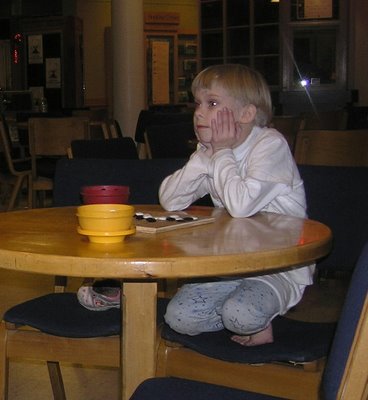
I found that I still was stressed though, so decided to play through some memorized games to calm myself. I started with the ear reddening game, and managed to screw up the taisha like four times before I got it right. Not a good sign. I guess I wasn't as calm as I had envisioned myself.
Moved on to Go Seigen's Game of the Century, and it didn't take long before my friend joined me and he played W, I played B. We were fuzzy on a few details, but managed most of it. After playing through most of it once, went through it again, this time straightening out the details we missed before. I found that playing out a pro game on a board really helped to ground me and get me ready for my games.
Almost time for the second round, the pairings were being decided. I had entered as a 2k, and my first game was against a 1k. Good time to measure whether the 2k rank was a reasonable guess.
We had it all set up perfectly. I left my house at 7am, to pick up a friend and we would meet two other friends at 8:45am in Vermont to car pool from there. I arrived at my friend's house and waited for him, but nothing happened. I rang the bell, knocked the door, nothing happened. Time was passing.
Decided to check his fraternity to see whether he was there, but no luck. Back to his house, where I finally managed to wake up his room mate who woke up my friend. Time was passing.
By now it was so much past the original time to meet, that we knew we would have to drive to the tournament ourselves. So we bought a map of Vermont, and desperately called around to people, finding out that Vermont doesn't have much cell phone reception. Eventually managed to reach the Tournament Director, to tell him that we were late, but would be there in time for the second round.
We relaxed and talked about go, and arrived there while the first round was still going on, all was good.

I found that I still was stressed though, so decided to play through some memorized games to calm myself. I started with the ear reddening game, and managed to screw up the taisha like four times before I got it right. Not a good sign. I guess I wasn't as calm as I had envisioned myself.
Moved on to Go Seigen's Game of the Century, and it didn't take long before my friend joined me and he played W, I played B. We were fuzzy on a few details, but managed most of it. After playing through most of it once, went through it again, this time straightening out the details we missed before. I found that playing out a pro game on a board really helped to ground me and get me ready for my games.
Almost time for the second round, the pairings were being decided. I had entered as a 2k, and my first game was against a 1k. Good time to measure whether the 2k rank was a reasonable guess.
Tournament Tales I: The Preparation
So much to tell about the tourney. It was a wonderful day. I will have to do it in installments, as to also get some studying in. Especially for Ash, I'll start with how I prepared for this tourney.
First step was my familiar pre-tourney 'I will lose all my games!' stress-out. I talked about this with a friend and he helpfully told me that he still HATES playing tournament games (after soooo many years of playing them). He did tell me that it would help to play in a lot of tournaments, so that will be one of the steps of my recovery program :) I wallowed in my negative state of self-pity, till Flameblade slapped me out of it and told me to get over it already (paraphrased). He gave me helpful tips, and I replaced my whining with visions of Calmness, Focus, and Good Moves. Not to say that the fear of losing all my games was totally gone, but it was just a tiny bit of self doubt instead of an almost all-consuming worry.
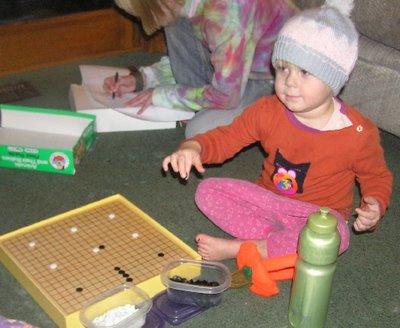
I wanted to do extra tsumego before the tourney, but ended up doing my normal amount. I avoided 'non-thinking' games on mess-up accounts, only played serious games for the days leading up to the tourney. I spent a lot of time replaying pro games, feeling that the spirit of those games would help me in my tournament.
I did some joseki review, but not much. I figured that if a particular joseki wasn't in my head by now, would be hard to study it in a hurry just to not use it in the tournament anyway.
At go club, we played a serious simul instead of normal relaxed club games, which also helped me to get into the tournament mood. The night before the tourney, I watched one of Guo Juan's 'How to Win a Won Game' lectures, and attended the shygost lecture. I even went to bed before midnight!
Stay tuned for Episode II.
First step was my familiar pre-tourney 'I will lose all my games!' stress-out. I talked about this with a friend and he helpfully told me that he still HATES playing tournament games (after soooo many years of playing them). He did tell me that it would help to play in a lot of tournaments, so that will be one of the steps of my recovery program :) I wallowed in my negative state of self-pity, till Flameblade slapped me out of it and told me to get over it already (paraphrased). He gave me helpful tips, and I replaced my whining with visions of Calmness, Focus, and Good Moves. Not to say that the fear of losing all my games was totally gone, but it was just a tiny bit of self doubt instead of an almost all-consuming worry.

I wanted to do extra tsumego before the tourney, but ended up doing my normal amount. I avoided 'non-thinking' games on mess-up accounts, only played serious games for the days leading up to the tourney. I spent a lot of time replaying pro games, feeling that the spirit of those games would help me in my tournament.
I did some joseki review, but not much. I figured that if a particular joseki wasn't in my head by now, would be hard to study it in a hurry just to not use it in the tournament anyway.
At go club, we played a serious simul instead of normal relaxed club games, which also helped me to get into the tournament mood. The night before the tourney, I watched one of Guo Juan's 'How to Win a Won Game' lectures, and attended the shygost lecture. I even went to bed before midnight!
Stay tuned for Episode II.
Friday, December 08, 2006
Tourney Training
I am in my normal pre-tourney 'I can't play go, I will lose all my games, and this will prove how worthless I am!' phase. Gotta love that pre-tourney stress I can talk myself into.

Last night, I whined about it to a good KGS friend, and told her I wasn't too worried about playing stronger players, but I was wondering about my handicap giving skills. She said 'Why don't you try giving me handi?', so we played at 8H. I wasn't too impressed with my handi skills but managed to kill a big group. Still a close game though. At least it made me feel better about giving handi.
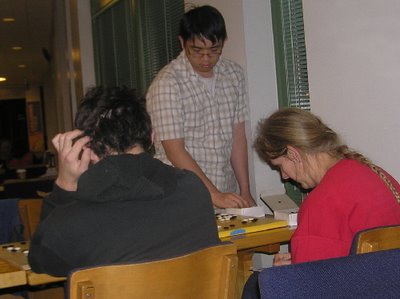
Today at go club, we worked on tourney training also. Our 4d gave a simul, playing five people (well, one was Kate on 9x9 :). I took 4H and had a reasonable game. I got all four corners and reduced enough of his huge center to win. Still made too many mistakes though. Will have to work on that :)
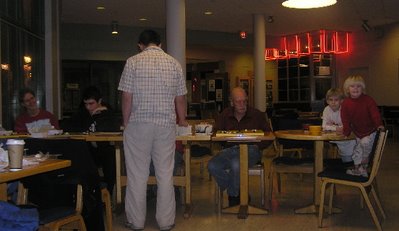
Drove home in our first snow storm, it'd better not snow on Saturday! The tourney is at the other side of Vermont, will have to cross the Green Mountains.

Before the simul, Kate played her 2 years-old sister Sylvia. Sylvia loves playing with Kate, even has learned how to hold the stones correctly. And Kate enjoys teaching Sylvia. It will be a while before she gets the game, but they are having fun together.
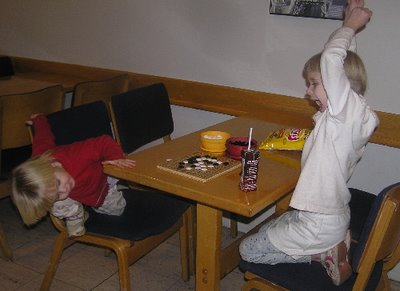
They played seriously for a while, but then it evolved into this ^^

Last night, I whined about it to a good KGS friend, and told her I wasn't too worried about playing stronger players, but I was wondering about my handicap giving skills. She said 'Why don't you try giving me handi?', so we played at 8H. I wasn't too impressed with my handi skills but managed to kill a big group. Still a close game though. At least it made me feel better about giving handi.

Today at go club, we worked on tourney training also. Our 4d gave a simul, playing five people (well, one was Kate on 9x9 :). I took 4H and had a reasonable game. I got all four corners and reduced enough of his huge center to win. Still made too many mistakes though. Will have to work on that :)

Drove home in our first snow storm, it'd better not snow on Saturday! The tourney is at the other side of Vermont, will have to cross the Green Mountains.

Before the simul, Kate played her 2 years-old sister Sylvia. Sylvia loves playing with Kate, even has learned how to hold the stones correctly. And Kate enjoys teaching Sylvia. It will be a while before she gets the game, but they are having fun together.

They played seriously for a while, but then it evolved into this ^^
Monday, December 04, 2006
The Most Complicated Joseki of All
Talking about the large avalanche. Usually when people start the avalanche, I take the easy way out, but last week I decided differently. Figured the only way to learn to play it is by actually experimenting with it and get killed many times over :)
I played this game at club in which W started an avalanche pattern:
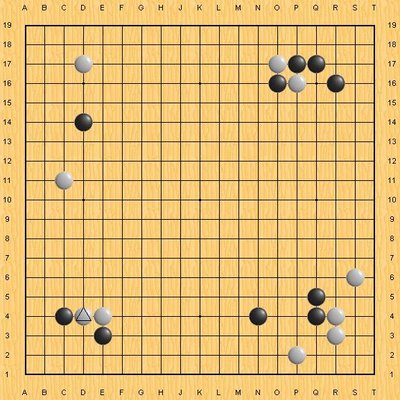
Usually I take the easiest way out and play like this:
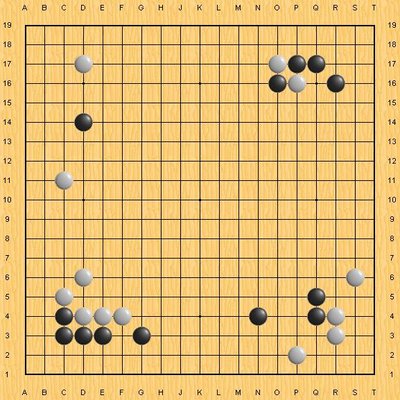
Seems too good for W on this board though. According to sendol, the correct way to play would have been this way:
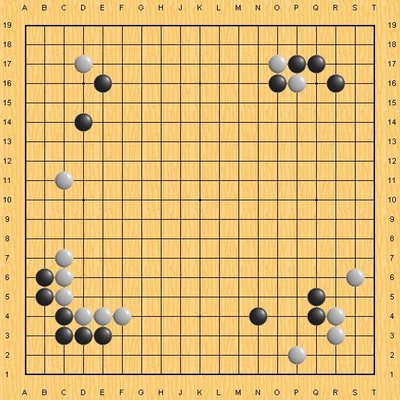
This looks a lot better for B. I hadn't seen that solution though, so decided to take a deep breath and start the large avalanche. Worst thing I could do was screw it up, right?
It wasn't too bad, just didn't punish when W played wrong order of moves. At least thanks to sendol, I now know the proper punishment :) Of course, 'not too bad' was talking about locally, globally the result feels good for W.
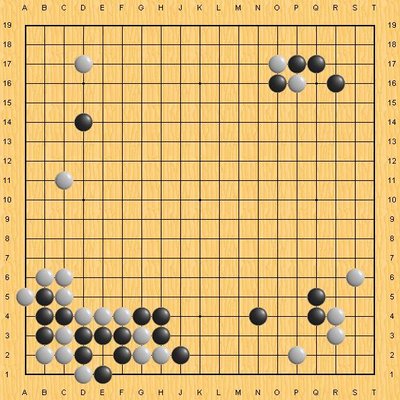
But at this point, I didn't care, was just happy to actually have played the large avalanche in a game and not mess it up too badly. The rest of the game was very interesting, but I missed fatal chances and ended up getting myself killed. Oh well, I enjoyed it anyway. And I learned quite a lot, will have to spend more time studying this. So much to study, so little time ^^
I played this game at club in which W started an avalanche pattern:

Usually I take the easiest way out and play like this:

Seems too good for W on this board though. According to sendol, the correct way to play would have been this way:

This looks a lot better for B. I hadn't seen that solution though, so decided to take a deep breath and start the large avalanche. Worst thing I could do was screw it up, right?
It wasn't too bad, just didn't punish when W played wrong order of moves. At least thanks to sendol, I now know the proper punishment :) Of course, 'not too bad' was talking about locally, globally the result feels good for W.

But at this point, I didn't care, was just happy to actually have played the large avalanche in a game and not mess it up too badly. The rest of the game was very interesting, but I missed fatal chances and ended up getting myself killed. Oh well, I enjoyed it anyway. And I learned quite a lot, will have to spend more time studying this. So much to study, so little time ^^
Saturday, December 02, 2006
Yilun Yang's Workshop Lectures, Volume 2
My leg has been acting up, so I figured that would be a good opportunity to lay down and read volume 2 of Yang's Workshop Lectures. I had been looking forward to reading this volume, and yet again, I did not get disappointed. I always wanted to attend one of the Yang workshops, but couldn't pull it off logistically, and this seems like it's the next best thing.
The first lecture is on How to Invade. It gives rules of when invading is possible, and shows how to decide where to invade and how to follow up. In the process of invading, it also gives a lot of information on life and death. Yang has a multi step process on how to live and how to kill. I had heard about his killing process, but it was nice to see the rules on paper and explained more. It made more sense with the examples he gave as opposed to when I just heard the steps listed.
Lecture nr 2 was about Choosing the Right Pincer. This is similar to one of the chapters in his 'Fundamental Principles of Go'. This lecture seemed to go deeper (I don't have the fundamental book with me to compare, this is just from memory). He also talks about how to think and find the right move when your opponent plays a non-standard reply to the pincer. Interesting stuff and it explained why I got a bad result in a few recent games. It is nice to see so many things which are immediately applicable in one's games.
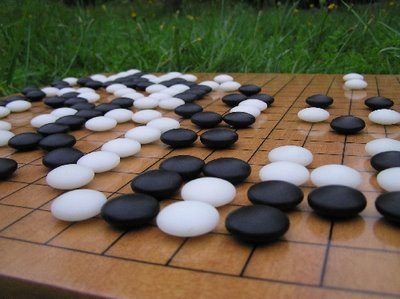
The third lecture is about side extensions in the opening. This lecture gave me a lot of new information. New tidbits to ponder about the opening. Over time, I have spent so many hours staring at board positions, trying to figure out what would be the best extension in that situation. This book will help me make better choices. This chapter, like all the others, is full of practical examples.
Fourth lecture is 'Playing a Territorial Game'. I know I am raving, but I am just amazed at the amount of information packed in a relatively small book. I have played territorial games where my opponent ended up with the whole center and I wasn't able to destroy it. This book gives me new tools and new ways to play territorial games, I can't wait to experiment with it.
Last lecture is the opposite subject with 'Playing a Moyo Game'. It gives a lot of guidelines for moyo games, how to play, how not to play. It shows a generous number of examples of how to deal with invasions in your moyo, and about correct and wrong direction of play. In both of these chapters, he stresses how important it is to be consistent, and not to switch back and forth between different styles of play. A good lesson to learn.
This book has so much information, it will take me a while to study and digest it all. I feel I only touched the tip of the knowledge in here during my first reading. It warrants sitting down with a goban and playing out the different variations. Over and over. I will take the book to go club with me today, will be good to complement our study session.
The first lecture is on How to Invade. It gives rules of when invading is possible, and shows how to decide where to invade and how to follow up. In the process of invading, it also gives a lot of information on life and death. Yang has a multi step process on how to live and how to kill. I had heard about his killing process, but it was nice to see the rules on paper and explained more. It made more sense with the examples he gave as opposed to when I just heard the steps listed.
Lecture nr 2 was about Choosing the Right Pincer. This is similar to one of the chapters in his 'Fundamental Principles of Go'. This lecture seemed to go deeper (I don't have the fundamental book with me to compare, this is just from memory). He also talks about how to think and find the right move when your opponent plays a non-standard reply to the pincer. Interesting stuff and it explained why I got a bad result in a few recent games. It is nice to see so many things which are immediately applicable in one's games.

The third lecture is about side extensions in the opening. This lecture gave me a lot of new information. New tidbits to ponder about the opening. Over time, I have spent so many hours staring at board positions, trying to figure out what would be the best extension in that situation. This book will help me make better choices. This chapter, like all the others, is full of practical examples.
Fourth lecture is 'Playing a Territorial Game'. I know I am raving, but I am just amazed at the amount of information packed in a relatively small book. I have played territorial games where my opponent ended up with the whole center and I wasn't able to destroy it. This book gives me new tools and new ways to play territorial games, I can't wait to experiment with it.
Last lecture is the opposite subject with 'Playing a Moyo Game'. It gives a lot of guidelines for moyo games, how to play, how not to play. It shows a generous number of examples of how to deal with invasions in your moyo, and about correct and wrong direction of play. In both of these chapters, he stresses how important it is to be consistent, and not to switch back and forth between different styles of play. A good lesson to learn.
This book has so much information, it will take me a while to study and digest it all. I feel I only touched the tip of the knowledge in here during my first reading. It warrants sitting down with a goban and playing out the different variations. Over and over. I will take the book to go club with me today, will be good to complement our study session.
Friday, December 01, 2006
One Month of Go
Kate has played for about a month now and seems to be getting more addicted. I can only approve. Yesterday was the first time she could come to go club again after I broke my leg. She was very happy about it. 'It feels so good, it feels like going to a friend's house!' Glad she likes the atmosphere at club.

She has been playing some games on KGS. Today, I looked through them and she is up to 39 of them now. Most of those were 9x9 though, she is still hesitant to play 19x19. She does play 19x19 on her own goban but it seems scary to her on KGS. I told her she could try playing a 37x37 game and then 19x19 would seem small, but she didn't fall for it.
She is improving fast, I love watching her figuring out things and starting to read more. She still leaves cuts, but more and more she is looking at them and actually reading out before protecting. Showing me 'See, if he plays here, I can play here, and he will play there, and I will play here, and he will be dead'. Fascinating process.

She has been playing some games on KGS. Today, I looked through them and she is up to 39 of them now. Most of those were 9x9 though, she is still hesitant to play 19x19. She does play 19x19 on her own goban but it seems scary to her on KGS. I told her she could try playing a 37x37 game and then 19x19 would seem small, but she didn't fall for it.
She is improving fast, I love watching her figuring out things and starting to read more. She still leaves cuts, but more and more she is looking at them and actually reading out before protecting. Showing me 'See, if he plays here, I can play here, and he will play there, and I will play here, and he will be dead'. Fascinating process.
Subscribe to:
Comments (Atom)
